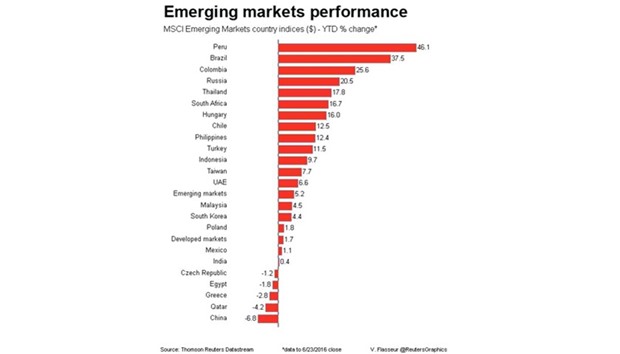Emerging stocks tumbled more than 3% yesterday after Britain’s shock vote to exit the European Union, while currencies plunged against the dollar, forcing central banks to intervene or pledge action if needed.
The referendum outcome pushed world stocks into freefall, drove up the dollar and yields on US and German bonds, while emerging assets were pummelled across the board.
MSCI’s main emerging equity index has so far posted its biggest one-day fall since last August while emerging dollar bonds’ average yield spread over US Treasuries blew out 30 basis points on JPMorgan’s EMBI Global index.
Debt insurance costs surged in the credit default swaps (CDS) market and implied volatility on a range of currencies, from the South African rand to the Polish zloty, jumped to multi-month or multi-year highs.
The snapback is all the more sharp, given that opinion polls and bookmakers’ indications of a “Remain” outcome had boosted emerging assets in recent days.
“High-yielding currencies such as the rand, lira and rouble — which were favored emerging market longs into the event — will be unwound heavily,” Citi’s head of CEEMEA debt and FX strategy Luis Costa said. China’s yuan slumped to more than 5-year lows against the dollar, which traders said had prompted the central bank to sell dollars via state-run banks. The Korean central bank was also spotted intervening to steady the won from its worst one-day fall in five years.
India’s central bank pledged “all necessary steps” including injecting dollars or rupees to ensure orderly conditions while Singapore said it was ready to curb excessive volatility in its currency.
Eastern European countries with close ties to the UK via remittances and which are net recipients of EU funds saw sharp currency falls, with the zloty and forint down more than 2% against the euro while the Serbian dinar fell to a record low, triggering euro sales by the central bank.
Poland’s central bank however has said it sees no reason to intervene. Analysts at Nomura estimate that Brexit would shave around 0.5% from Czech and Hungarian growth while Poland stood to lose 0.25%.
Stocks posted heavy losses with the Warsaw exchange, the region’s biggest, down almost 6% to a seven-year low. Kasper Bartholdy, head of emerging fixed income at Credit Suisse said eastern Europe would not necessarily be the worst affected by Brexit, with bigger commodity exporters such as South Africa, Brazil and Mexico looking especially vulnerable.
That is especially so as these big liquid markets also have big current account deficits
The rand was among the bigger losers of the day, falling as much as 8% at one point against the dollar while the stock market lost 3.5%.
Local bond yields rose around 30 basis points.
UBS data shows South Africa has above-average links to the UK compared to most emerging markets, with its equity index carrying a roughly 5% revenue exposure to the British economy.
The Mexican peso, often used as a proxy for Latin America, fell 5% to a record low.
Credit Suisse’s Bartholdy however downplayed the longer-term impact of Brexit on emerging economies.
“It’s normal to see some nervousness but I don’t think it will last as long or be as deep as the eurozone crisis (of 2012),” he said.

